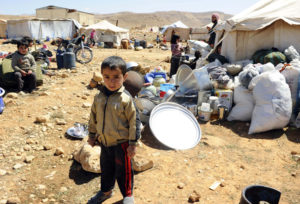Victims of Syrian conflict falling into poverty
Poverty is rising alarmingly among Syrian refugees living in neighbouring countries putting them at risk of falling victim to exploitation and loan sharks, according to a new report.
A survey carried out by the United Nations High Commissioner for Refugees (UNHCR) in five host countries shows Syrian refugees are finding it increasingly more difficult to make ends meet.
The mid-year report of the 2016 Regional Refugee and Resilience Plan (3RP) found that while significant progress had been made in providing assistance to millions of Syrian refugees living in Lebanon, Jordan, Turkey, Iraq, and Egypt, poverty continues to rise in host countries in the region and providing access to basic services remains a critical challenge.
Syria is into its sixth year of conflict. Nearly five million Syrians have taken refuge in those five countries. Turkey alone is sheltering 2.7 million Syrian refugees.

Though the international community has increased its contributions for Syrian relief, the UNHCR says that remains far from enough.
UNHCR spokesman Leo Dobbs this week said living conditions everywhere were becoming more difficult for the refugees.
In Lebanon, for example, the average debt held by refugee households has increased in the first quarter of this year.
“The number living below the poverty level has risen to 70 per cent compared to 50 percent two years ago,” Mr Dobbs said.
“In Jordan also there is a similar pattern. Ninety per cent of registered Syrian refugees in urban areas are below the national poverty line, while over 67 per cent are living in debt. In Egypt, some 62,000 refugees are living in poverty.”
Mr Dobbs said the Syrian crisis had been going on for such a long time that people were running out of resources, opening them up to exploitation and protection risks associated with increasing poverty.
“It is a disturbing development and with impoverishment comes the danger of people becoming more vulnerable and they are susceptible to negative coping mechanisms,” he said.
“Children going out to work, people being forced into commercial sex work – those are some of them,” Mr Dobbs.
The UNHCR says much more money is needed to prevent more Syrian refugees from becoming impoverished.
The report says less than one-third, or $1.38 billion of the $4.55 billion requested by the UN inter-governmental and non-governmental organisations early this year, has been received.
The report said that, with the generous support of donors, 3RP partners have in 2016 delivered cash assistance to 102,853 households, food to 2,035,767 individuals, 1,090,795 primary health care consultations, shelter assistance to 25,148 households and other forms of emergency assistance to refugees and host populations. Support was provided to 5,603 people to find employment.
There was also promising news in the livelihoods sector, with work permits issued by Jordan to Syrians and a new regulation allowing Syrian refugee access to employment in Turkey.
These positive initiatives, supported at February’s London Conference on Syria, need to be matched by the international community with continuing generous funding and responsibility sharing.
Despite this progress, the report warns of growing poverty.
“With UNHCR and its 3RP partners already looking toward planning for 2017 and beyond, continued international solidarity is needed so that agencies across all sectors and countries can better plan interventions, allocate resources and provide consistent and predictable assistance to beneficiaries, and longer-term support to host communities,” the report said.
Laurie Nowell
AMES Australia Senior Journalist












